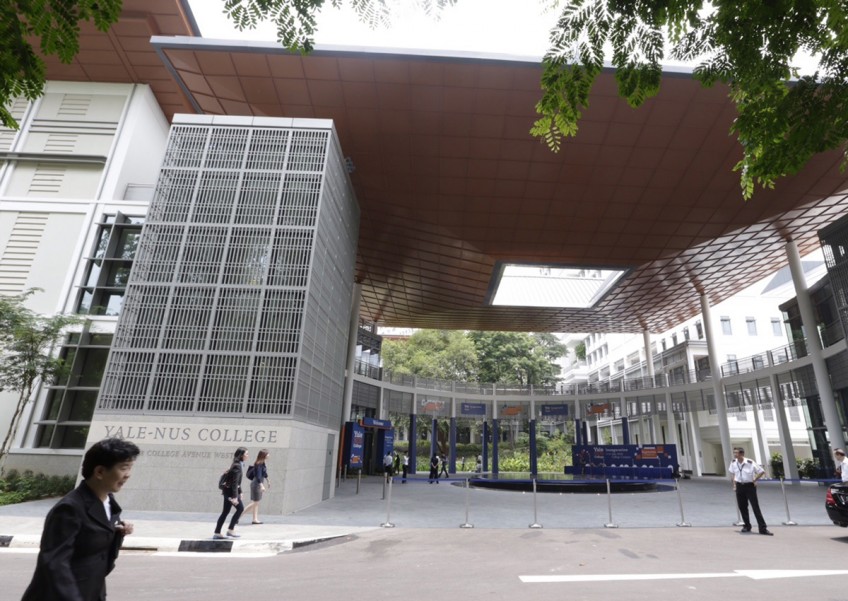Yale-NUS adopts Latin honours system

The Yale-NUS College has become the second institution here to adopt the Latin honours system, a degree classification used by American universities such as Harvard and Yale.
The system, which indicates the level of distinction a graduate has earned, uses nomenclature such as summa cum laude and magna cum laude. The Singapore Management University (SMU) also uses the terms.
But, unlike SMU which does not limit the number of students who can earn Latin honours, Yale-NUS has imposed a 35 per cent cap.
The policy, which was made known to students through an official e-mail in March, has drawn mixed reactions from them.
Some students said it would be hard to know for sure how they are faring each semester as their final honours level would be made known to them only at the end of four years. This is because they are not marked on a bell curve throughout the four years, unlike their peers at the National University of Singapore (NUS).
The Latin honours is on top of the bachelor's honours degree in arts or science that all students receive after completing the four-year undergraduate honours programme.
The top 5 per cent are awarded summa cum laude, while the magna cum laude goes to not more than the next 10 per cent, and cum laude to not more than the next 20 per cent.
There is also a cap within each major - no more than 60 per cent or six of the students (whichever is larger) will receive honours at the cum laude level or above.
Similarly, no more than 40 per cent or four of the students (whichever is larger) will receive honours at the magna cum laude level or above. There are 14 majors at Yale-NUS. Class sizes for the majors in the inaugural batch range from three to 16, with philosophy and physical sciences being the smallest, and politics, philosophy and economics drawing the most students.
In response to queries, Professor Tan Tai Yong, executive vice-president (academic affairs) at Yale-NUS College, said Latin honours may not be commonly used here. But it is well-known globally, and the classifications are similar to those used by liberal arts and sciences colleges and universities in the United States and other countries. The college uses a different method of determining the level of honours due to its unique curriculum, smaller cohort and grading practices, he said, adding that using Latin honours also allows it to distinguish its system of honours from that of NUS.
Prof Tan noted that the Latin honours may not "directly equate to the various classes of degree honours conferred by institutions that follow other systems, such as the British system". Furthermore, the criteria for the levels of honours could differ across two institutions using the same honours terminology.
Other universities here, such as the Nanyang Technological University and SIM University, use the British honours system of first class, second-class upper, second-class lower and third class. Last year, NUS renamed its first-class honours as honours with highest distinction, second-class upper honours as honours with distinction, second-class lower honours as honours with merit and third-class honours as honours.
Prof Tan said the limits imposed on majors are meant to "recognise academic achievement within the major, in addition to the overall cumulative average point (CAP)". It is also to "help control for potential differences in grading across majors, and shifts in the average CAP from one graduating class to another".
About 170 Yale-NUS students signed a petition in March calling for the college to reconsider the honours system. One concern they had was that placing a cap within each major would lead to unhealthy competition, especially in courses with fewer than 10 students.
Some were also unhappy that the honours system was revealed only this year. Yale-NUS student Sherlyn Goh, 22, who belongs to its first batch which graduates next year, said: "Many of us had assumed that we would follow NUS' fixed CAP system."
The arts and humanities major also said having a bell curve system throughout the four years is better.
"It's important that students know how we are doing academically so that we can take steps to improve our work or plan our modules more strategically."
Global affairs major Dennis Chiang, 25, said some students think it might be unfair if they have the same CAP as an NUS student but do not make the 35 per cent cut for Latin honours. But he said that work experience would count more in his choice of career, either in policy work or journalism.
Prof Tan said Yale-NUS will recognise students' academic and non-academic achievements through other ways such as prizes and awards. He said that the college is "very confident" that students who do well in their studies and co-curricular activities, and those who prepare for work through internships or engaging professional networks will be "strong contenders in the job market or for graduate programmes".
Mr David Leong, managing director of recruitment firm PeopleWorldwide Consulting, said employers are increasingly looking at graduates' work experience.
"They also look at the role and responsibility of the job position, and the salary package is based more on that than the qualification of the applicant," he said. "Even master's degrees have marginal difference in salary offers, compared to someone with relevant work experience."

This article was first published on May 9, 2016.
Get a copy of The Straits Times or go to straitstimes.com for more stories.